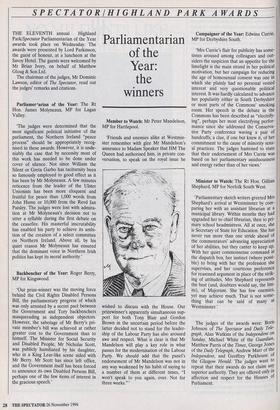SPECTATORIHIGHLAND PARK AWARDS
Parliamentarian of the Year: the winners
THE ELEVENTH annual Highland Park/Spectator Parliamentarian of the Year awards took place on Wednesday. The awards were presented by Lord Parkinson, the guest of honour, at a luncheon at the Savoy Hotel. The guests were welcomed by Mr Brian Ivory, on behalf of Matthew Gloag & Son Ltd.
The chairman of the judges, Mr Dominic Lawson, editor of The Spectator, read out the judges' remarks and citations.
Parliamer•arian of the Year: The Rt Hon. James Molyneaux, MP for Lagan Valley.
`The judges were determined that the most significant political initiative of the parliament, the Northern Ireland "peace process" should be appropriately recog- nised in these awards. However, it is unde- niably the case that by necessity most of this work has needed to be done under cover of silence. Not since William the Silent or Greta Garbo has taciturnity been so famously employed to good effect as it has been by Mr Molyneaux. A few minutes reticence from the leader of the Ulster Unionists has been more eloquent and fruitful for peace than 1,000 words from John Hume or 10,000 from the Revd Ian Paisley. The judges were lost with admira- tion at Mr Molyneaux's decision not to utter a syllable during the first debate on the ceasefire. His masterful inscrutability has enabled his party to achieve its ambi- tion of the creation of a select committee on Northern Ireland. Above all, by his quiet reason Mr Molyneaux has ensured that the dominant voice in Northern Irish politics has kept its moral authority.'
Backbencher of the Year: Roger Berry, MP for Kingswood.
`Our prize-winner was the moving force behind the Civil Rights Disabled Persons Bill, the parliamentary progress of which was only arrested by a secret pact between the Government and Tory backbenchers masquerading as independent objectors. However, the sabotage of Mr Berry's pri- vate member's bill was achieved at rather greater cost to the Government than to himself. The Minister for Social Security and Disabled People, Mr Nicholas Scott, was publicly humiliated by his daughter, who in a King Lear-like scene sided with Mr Berry. Mr Scott has since left office, and the Government itself has been forced to announce its own Disabled Persons Bill, perhaps one of the few items of interest in the gracious speech.' Member to Watch: Mr Peter Mandelson, MP for Hartlepool.
`Friends and enemies alike at Westmin- ster remember with glee Mr Mandelson's assurance to Madam Speaker that HM The Queen had authorised him, in private con- versation, to speak on the royal issue he wished to discuss with the House. Our prizewinner's apparently simultaneous sup- port for both Tony Blair and Gordon Brown in the uncertain period before the latter decided not to stand for the leader- ship of the Labour Party has also aroused awe and respect. What is clear is that Mr Mandelson will play a key role in what passes for the modernisation of the Labour Party. We should add that the panel's endorsement of Mr Mandelson was not in any way weakened by his habit of saying to a number of them at different times, "I won't speak to you again, ever. Not for three weeks."' Campaigner of the Year Edwina Currie, MP for Derbyshire South.
'Mrs Currie's flair for publicity has some- times aroused among colleagues and out- siders the suspicion that an appetite for the limelight is the main strand in her political motivation, but her campaign for reducing the age of homosexual consent was one in which she plainly had no personal vested interest and very questionable political interest. It was hardly calculated to advance her popularity either in South Derbyshire or most parts of the Commons' smoking room. Her speech in the debate in the Commons has been described as "electrify- ing", perhaps her most electrifying perfor- mance since she addressed the Conserva- tive Party conference waving a pair of handcuffs; a clue, if one but knew it, of her commitment to the cause of minority sexu- al practices. The judges hastened to state that their endorsement of Mrs Currie was based on her parliamentary assiduousness and energy rather than of her views.'
Minister to Watch: The Rt Hon. Gillian Shephard, MP for Norfolk South West.
`Parliamentary sketch writers greeted Mrs Shephard's arrival at Westminster by com- paring her with an assistant librarian at a municipal library. Within months they had upgraded her to chief librarian, then to pri- mary school headmistress. All at once, she is Secretary of State for Education. She has never run more than one stride ahead of the commentators' advancing appreciation of her abilities, but they canter to keep up. With her quiet commonsense command at the dispatch box, her instinct (where possi- ble) to bring with her the profession she supervises, and her courteous preference for reasoned argument in place of the strik- ing of attitudes, Mrs Shephard represents the best (and, doubters would say, the lim- its), of Majorism. She has few enemies, yet may achieve much. That is not some- thing that can be said of many at Westminster.'
The judges of the awards were: Boris Johnson of The Spectator and Daily Tele- graph, Alan Watkins of the Independent on Sunday, Michael White of the Guardian, Matthew Parris of the Times, George Jones of the Daily Telegraph, Andrew Man of the Independent, and Geoffrey Parkhouse of the Glasgow Herald. The judges want to repeat that their awards do not claim any superior authority. They are offered only in affection and respect for the Houses of Parliament.










































































 Previous page
Previous page